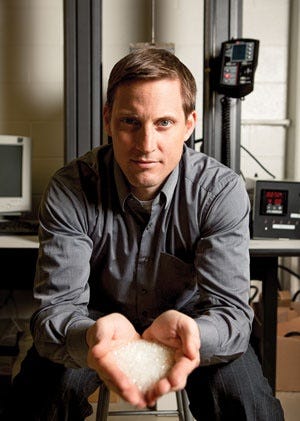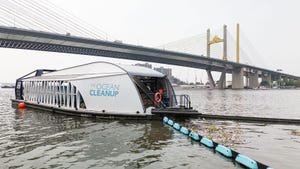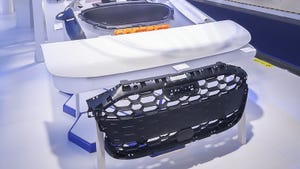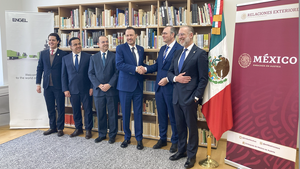Making it in bioplastics: Solegear’s Toby Reid talks about the industry's challenges and chances
Over the past years, as the plastics industry has increasingly been confronted with issues ranging from high raw material costs and limited fossil fuel resources to tightened environmental and end-of-life legislation, interest in bioplastics has grown considerably. One consequence of this has been a considerable rise in the number of players entering this market.
December 17, 2014
Over the past years, as the plastics industry has increasingly been confronted with issues ranging from high raw material costs and limited fossil fuel resources to tightened environmental and end-of-life legislation, interest in bioplastics has grown considerably. One consequence of this has been a considerable rise in the number of players entering this market.
However, it's a demanding sector, and one that takes persistence and passion to survive in. It is today also still very much a niche market - although one that offers multiple perspectives, with growth rates predicted to reach 400% over the next five years, according to European Bioplastics Association. Vancouver-based bioplastics manufacturer Solegear, established in 2005, is one of the companies that is working to make that happen. PlasticsToday talked to Solegear founder and CEO Toby Reid about the drive to make plastics sustainable.
What or who inspired you to get into bioplastics?
|
Solegear's Toby Reid |
Reid: "During a five-year stint at Mountain Equipment Co-op, Canada's largest outdoor retailer ($300 million+ revenues per year), I learned all about the global supply chain for plastics. Though I was involved in launching MEC's e-commerce channel, I was drawn to seek solutions for the problems we all face with many types of plastics: pollution, energy intensity and chemical safety. At this time, I had been observing an increasing amount of plastics washing up on the shores of the west coast of North and Central America and believed that there would be a need for next generation of solutions that would help to optimize the mix of getting the right plastics in the right applications."
What do you think sets your company apart from that of others in your field? And your product?
"There are many great bioplastics companies out there, so we're humbled to be in the company of such a great global group of firms. Solegear is known to be a specialist in engineering bioplastics to work in more demanding applications for rigid packaging and durable products. Solegear uses Green Chemistry to achieve greater performance characteristics for our proprietary materials, allowing us to create lightweight packaging structures and meet demanding durable product specifications. So, performance is a distinguishing feature for Solegear, while Green Chemistry allows us to produce a more eco efficient set of materials."
What are you most trying to accomplish in your work?
"Solegear's mission is to make our communities healthier, safer and stronger by changing the way that we make and dispose of products made of plastic. As our Chief Technologist says, "there's no such thing as bad plastics, only bad applications of plastics." Given that bioplastics have now evolved to the point where the quality and reliability now meet, and in some cases, surpass the performance of incumbent plastics, our opportunity is to work with the right partners to prove these elements in the marketplace. Both the business need and the consumer demand are there for bioplastics, so we remain committed to a conversation that seeks to optimize the applications for all plastics. Our next area of focus is driving progressive regulations and building political will, that matches the public's desires, to secure a brighter future for the industry."
What have been the (greatest) challenges that you have encountered?
"There are a lot of misconceptions about bioplastics and their quality and durability. Fortunately, Solegear's partners are helping us to dispel those myths. A second challenge we face is moving the dial on regulation and motivating change at the policy level. The tendency by regulators to resist innovation in the plastics industry comes from the legacy of traditional, petroleum-based products, a very powerful and influential group. We are committed to proving through science and research, and through customer validation that bioplastics can compete with and in many cases, out perform incumbent plastics."
The bioplastics field is notoriously difficult to be successful in - how has Solegear managed?
"We believe that our success to date has been two-fold. Firstly, we have had the benefit of hiring the right people with the right skills to ensure we stay on the leading edge of the science and innovation of bioplastics. Secondly, we have also sought out the right business partners in the industry, those who have the same vision for transforming the market, while also wanting to provide high quality products to their customers. It's like the old proverb "if you want to go fast, go alone, if you want to go far, go together". This approach and alignment has served us well as we have evolved."
Has serendipity played a role in developments at Solegear?
"Solegear's success to date has been determined by a mix of optimism, collaboration and a commitment to innovation, matched with solid science and proven formulations. We have gotten to where we are with a lot of persistence, hard work and learning from the process along the way. I'm very excited about Solegear's next chapter, for both our company and our materials, at local and global levels as we continue to move forward and grow."
About the Author(s)
You May Also Like



